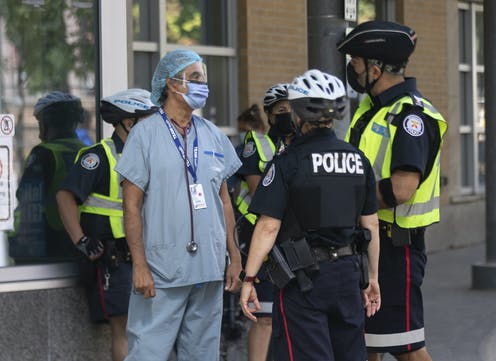
Even before the pandemic, managing patient expectations and dealing with disruptive behaviour in medical clinics was already the top stressor for physicians. It was identified as the biggest contributor to burnout in a recent survey by the Ontario Medical Association (OMA).
Examples of stressful clinic encounters include things like patients who demand drug prescriptions that aren’t medically needed, and those with unrealistic expectations about appointment availability, treatment results or wait times. During COVID-19, some patients became angry or confrontational about measures like masks and vaccinations.
A 2021 survey by advocacy group Doctors Manitoba found that 57 per cent of physicians reported mistreatment from at least one patient in the previous month. Verbal abuse included racist and sexist attacks, as well as being compared to a Nazi and accused of profiting from the pandemic. Other aggressive incidents included being spit on, vandalism, social media attacks, physical assault and death threats.
As the COVID-19 pandemic continued, physicians and other health-care workers faced new threats to their physical safety as protesters outside hospitals harassed staff over vaccine mandates. A national petition to put pressure on the federal government resulted in Bill C-3, enhanced legislation that increases penalties for harassment directed at health-care workers or restricting their ability to provide care.
Table of Contents
Top stressor, but last priority
As a primary-care researcher, I focus on family physicians. My current exploration of interventions to reduce burnout in their workplace is providing some intriguing data.
The Quadruple Aim approach to health systems has four pillars: optimizing patient experience, improving population health, reducing costs and supporting health-care providers. Previous research indicated that “care of the provider” was least likely of the four aims to be addressed.
Similarly, the OMA survey found that addressing patient expectations — the No. 1 stressor — and providing solutions to deal with it falls way down on the list of priorities for those same physicians, behind addressing other stressors like administrative overload and work-life balance. This suggests the biggest contributor to physician burnout is unlikely to change even when the added stressors of the pandemic end.
At a time when Canada is facing a health human resources crisis, burnout is one of the key issues driving health-care workers to leave the field. Meanwhile, abusive interactions and demands from patients with unrealistic expectations are increasing, contributing to that burnout and adding extra strain to a difficult role.
Supporting doctors and clinic staff

(Shutterstock)
Changes to the Criminal Code are welcome, but penalties only come after violence occurs. With a nod to the value of prevention, changes that support making clinics respectful and safe workplaces would support physicians as well as health-care staff and support workers.
Clinic receptionists also bear much of the brunt as displeased patients direct anger at them about inability to access immediate appointments or have insurance forms completed within a day or two. With minimal protocols or strategies in place to guide them, receptionists primarily rely on their experience to manage threatening situations.
Family physicians have limited choice as to who they provide care to. Reprisal from regulatory colleges limits physicians who want to speak out about aggressive patients, leading to acceptance as a way of adjusting to the demands of the job. The pressure to remain “patient-centred” should not limit a physician’s ability to outline clear expectations for patients, which should include civility at all times.
Addressing incivility
Making change requires speaking out about what needs to change, such as calling the abuse and mistreatment of physicians what it is. That is what Doctors Manitoba did following the disturbing results from its physician survey. Nudging patients to reconsider demands made of their family physician may require consistent messaging to be used and supported by all levels of government, so that there are no repercussions for physicians to speaking up.
In addition to raising awareness about incivility in clinics, there is a need for in-office protocols to provide direction for physicians and staff when faced with incidents of aggression. Clearly laid out principles for the clinical work environment may provide added authority to address incidents of aggression when they arise, and may reduce burnout among physicians. Such protocols could also inform patients that, as a basic standard of behaviour, aggression is not acceptable.

THE CANADIAN PRESS/Jeff McIntosh
Physicians are accustomed to dealing with patients at their most vulnerable, and manage emotionally charged patient encounters with compassion and understanding. They are trained to take each individual situation into account. However, workplace intimidation and violence must be considered occupational hazards for anyone working in a medical clinic.
A physician-patient agreement, which can spell out the responsibilities and accountabilities for both parties may be useful to establish a common understanding of what should be a positive, and long-term relationship. Clinic behaviour expectations which include zero tolerance for violence are not unreasonable.
Federal party leaders have expressed support for health-care workers during the COVID-19 pandemic, including condemned the harassment of health-care workers and blocking patient access at hospital protests. This support should not dissipate when COVID-19 eventually ends, and the time comes to address growing problems in health care identified during the pandemic.
The health-care system belongs to us all. As a major cause of physician burnout, this crisis of incivility and abuse threatens the people who patients need to trust when their health is at stake. It affects anyone who is a patient, has ever been a patient or is hoping to become a patient of a family physician.
![]()
Colleen Grady does not work for, consult, own shares in or receive funding from any company or organisation that would benefit from this article, and has disclosed no relevant affiliations beyond their academic appointment.























